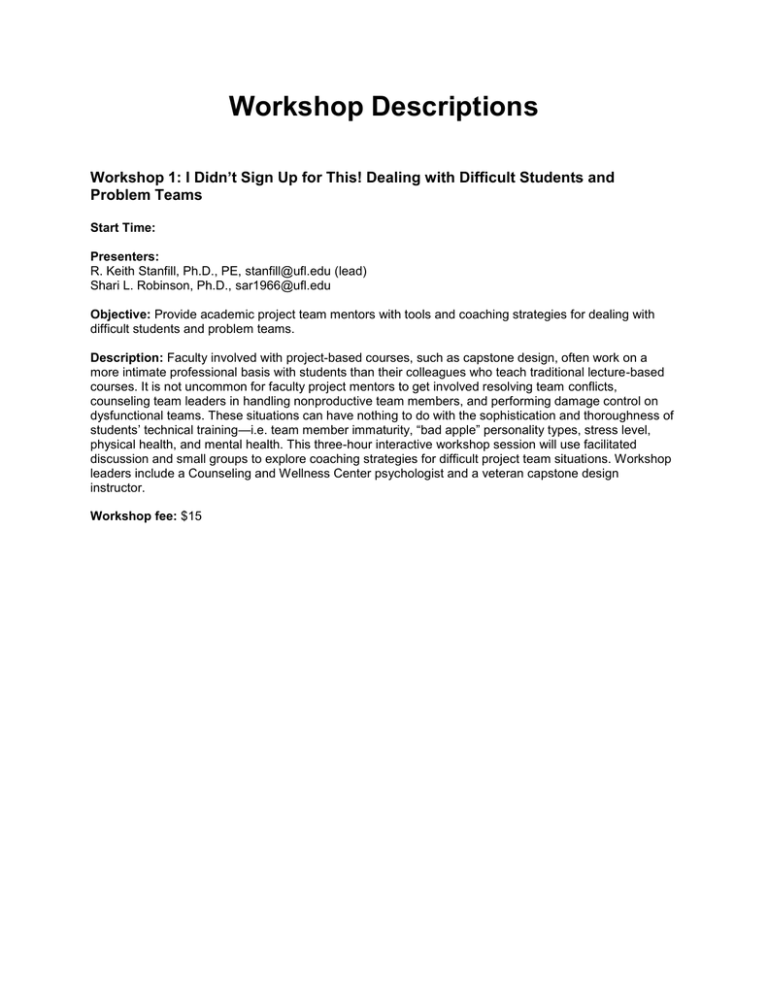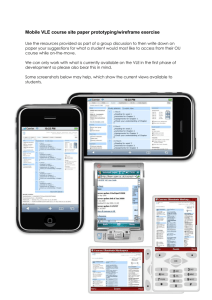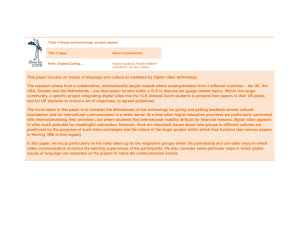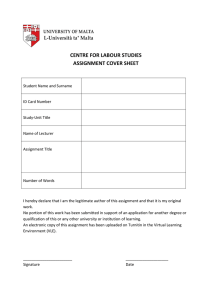HERE - University of Florida
advertisement

Workshop Descriptions Workshop 1: I Didn’t Sign Up for This! Dealing with Difficult Students and Problem Teams Start Time: Presenters: R. Keith Stanfill, Ph.D., PE, stanfill@ufl.edu (lead) Shari L. Robinson, Ph.D., sar1966@ufl.edu Objective: Provide academic project team mentors with tools and coaching strategies for dealing with difficult students and problem teams. Description: Faculty involved with project-based courses, such as capstone design, often work on a more intimate professional basis with students than their colleagues who teach traditional lecture-based courses. It is not uncommon for faculty project mentors to get involved resolving team conflicts, counseling team leaders in handling nonproductive team members, and performing damage control on dysfunctional teams. These situations can have nothing to do with the sophistication and thoroughness of students’ technical training—i.e. team member immaturity, “bad apple” personality types, stress level, physical health, and mental health. This three-hour interactive workshop session will use facilitated discussion and small groups to explore coaching strategies for difficult project team situations. Workshop leaders include a Counseling and Wellness Center psychologist and a veteran capstone design instructor. Workshop fee: $15 Workshop 2: Introduction to Arduino Start time: Sunday, April 12, 9:00 a.m.-12:00 PM Presenter: Richard Stansbury and Tim Wilson (Embry-Riddle Aeronautical University), wilsonti@erau.edu Workshop Goals: Learn the basics about programming the Arduino microcontroller Description: In this introduction to the Arduino microcontroller, participants will install the Arduino development environment, learn how to set up their computer to interface with Arduino, and then learn the basics about interfacing with sensors (push buttons, potentiometers) and actuators (LEDs). Arduinos and associated technology will be provided. Participants should have a Windows or Macintosh laptop. Workshop Fee: $20 Workshop 3: Intermediate Arduino Start time: Sunday, April 12, 1:00 p.m.-4:00 PM Presenter: Richard Stansbury and Tim Wilson (Embry-Riddle Aeronautical University), wilsonti@erau.edu Workshop Goals: Learn additional Arduino techniques Description: In this workshop, participants expand the range of devices interfaced to the Arduino beyond those of the introductory workshop. Sensors and actuators will include temperature sensors, servo motors, piezoelectric elements, DC motors, relays, shift registers, and liquid crystal displays. Participants should either have some experience with Arduino and the Arduino development environment, and they should bring a Windows or Macintosh laptop with the Arduino development environment already loaded. Arduinos and associated technology will be provided. Workshop Fee: $20 Workshop 5: Building Student Resilience for Increasing Completion Rates Start Time: Presenter names: Amanda Brooks, PhD. Co-founder. STEMbrite, LLC Chris Carson, MBA. Co-founder. STEMbrite, LLC STEMbrite, LLC is a Centennial partner on the NC State University campus and member of the NCSU Technology Incubator. An independent company, STEMbrite participates in private-public partnerships whose mission is to make university-developed, NSF-tested knowledge broadly accessible. Workshop Goals for Participants: To learn about a new methodology for helping students become increasingly resilient and persevere in the face of challenging academic curriculums like that of Engineering. To use and experience the online learning tool as students would. To understand how the Mindsets program fits into the Engineering curriculum as a course supplement and advising tool. To brainstorm appropriate uses for their own institutions. Workshop Overview: Many students admitted into Engineering programs come with strong high school or transfer backgrounds and find themselves unprepared for their first set of academic obstacles: they may be shocked to receive their first low grade or to be struggling with a project assignment. Some respond with helplessness; some drop out or change majors. At this time when professional Engineering organizations and the popular press alike are calling for increasing the diversity and number of graduates, these types of student responses run counter to university initiatives promoting enrollment and completion rates. This workshop introduces participants to Growth Mindsets Theory and how it can be used to supplement the existing Engineering course curriculum. The Mindsets program represents an interdisciplinary approach, using video-driven lessons to bring together proven psychological theory, student testimonials, faculty advice, and adult learning pedagogy to support students as they encounter challenging academic work. The two dominant strands of psychological theory - Growth Mindsets and Identity Threat - will be explained, with multiple real-world examples given. Participants will engage in interactive discussions and small group work. Importantly, each participant will have a hands-on opportunity to take the four (4) Mindsets Online Learning Modules that are given as student homework assignments during a typical introductory Engineering course. Participants will see how NC State University is using the model to build student resilience in their programs and brainstorm about how similar modules could be used at their home institutions. The modules are delivered online, requiring no class time and no grading by faculty members. However, the speakers and examples in each video are customized for each institution, creating a powerful learning tool. Finally, the content of the modules serves as a powerful guide for student advising and mentoring sessions. Workshop outline: 1. Current landscape for Engineering retention and completion programs a. Successful strategies and best practices b. Recurring issues and concerns 2. Building Student Resilience – Growth Mindsets a. NSF-funded studies: design and results b. Mindset Theory and Identity Threat c. Student and program examples 3. Mindsets Modules - Hands-on Experience Each participant will watch the 4 video-driven lessons and complete the short assignments (10 minutes each module). Mindsets SMART Goals Talent Myth Succeeding in Engineering 4. Small Group Discussions a. Reactions to Mindset Theory b. Leading faculty-student discussions c. Conducting advising sessions 5. Review of Modules as Supplements to Curriculum a. How currently used at NC State University b. How fits with existing introductory Engineering curriculum c. How to customize for an institution 6. Conclusion – Review of Session Workshop Fee: $5 Workshop 6: Embedded Systems Experiments Using the TI MSP430 Launchpad And NI myRIO Presenter: Prof. Harry C. Powell, hcp7ad@virginia.edu Charles L. Brown Department of Electrical and Computer Engineering Background: The ubiquity of embedded computational systems, ranging from implanted medical devices to the ever-present smart-phone, has led us to conclude that embedded computing should be considered as a central focus of modern curricula in Electrical and Computer Engineering. While the programming of embedded systems might be thought to be within the domain of Computer Science, we view it in a broader context by considering the embedded computer as an electrical component, in which the interfaces to the rest of the system are defined by software. With this larger view in mind, we can employ coursework in embedded computing to meet multifold objectives, and make it the nexus of coursework in Electrical and Computer Engineering. We have designed an introductory course in embedded computing for 3rd year students in ECE, in which the laboratory component is the primary focus of the course. The experiments are each built on the Texas Instruments Launchpad, with artisanal header boards designed at UVa. We have configured experiments for switch debouncing, working with 7 segment displays, quadrature encoders, accelerometers, motor controls with feedback, and 916 MHZ r.f. telemetry. Additionally, we have several student-designed header boards, including a WiFi capable experiment for IoT laboratories, and a dual stepper control fitted to an “Etch-A-Sketch” for using a microcontroller to draw pictures. Additionally we have adapted our experiments to be used with the National Instruments myRIO embedded platform. This gives educators the opportunity for using a common set of experimental interfaces for both low-level introductory courses, as well as higher level more advanced coursework. Goals: The goals for our workshop are to present a new pedagogy for laboratory experiments for embedded computing and to show simple inexpensive hardware that may be employed to develop experiments that would be adaptable to a number of engineering disciplines. It is readily adaptable “out of the box” for Electrical and Computer Engineers, but could also be adapted for a part of introductory courses in real-time programming for Computer Science Majors and as a component of mechatronics for Mechanical Engineers. Requirements: Each attendee would need a laptop computer, and the software is freely available from Texas Instruments. Workshop Fee: $5 Workshop 7: Workshop – Does Size Matter? Small Programs Contribute as Many Graduates to the Engineering Workforce as Large Programs Do Start Time: Presenter: Julie Ellis, Ph.D., P.E. Western Kentucky University Department of Engineering julie.ellis@wku.edu Background: The ASEE database on engineering schools reveals many interesting things about the diversity among engineering educational institutions. Number of engineering faculty, graduates, and programs vary considerably, yet they all contribute graduates into the engineering workforce. And programs of every size and every type need to be responsive to the needs of the workforce, indeed the world, in preparing graduates to meet the challenges our society is facing. This workshop will explore that diversity, focusing on the issues of engineering at small schools — the most common engineering program. In terms of graduates, the smallest 216 schools make the same contribution as the largest 22, as 40 other large schools, and 71 mid-size schools. Considering the collective impact of small schools on the total engineering workforce suggests that we should also examine the special characteristics of these schools and the challenges and opportunities for innovative engineering education there. Workshop Schedule (90 minutes total): Data workshop (30 minutes) – Share and explore institutional data on number of engineering programs, faculty, enrollment, and graduation rates. The primary data source is the ASEE database, but NAE and NSF data will also be employed. Spreadsheet versions of the data will be available for all participants. Based on the data, participants will categorize themselves into three groups: very small, smallish, and medium small. Small group topic explorations (30 minutes) – With at least one person from each size group, tables will characterize small programs in terms of 7-10 topics, depending on the number of tables in the room. enrollments, class sizes, and graduation rates faculty workload and expectations research and external funding activity institutional support use of part-time faculty, research associates, and graduate students relations with industry process for curriculum change academic pathways students follow Other topics suggested by participants will be added if the number of groups and tables allow. Participants will be asked to clearly identify characteristics as strengths or challenges in implementing change in engineering education. Compilation of composite descriptions (20 minutes) – Each topic group will report out, in order for the entire group to compile a small number (1-3) of valid composite descriptions of small engineering schools. These descriptions are one of the major work products of this session. The descriptions will highlight the common characteristics of these types of schools and the special advantages they possess for implementing innovations in engineering education, as well as the challenges they need to overcome, individually and collectively, in order to have a significant positive impact on the engineering workforce. Next steps (10 minutes) – Many ideas about next steps will emerge in the discussions. We will identify 1– 3 specific projects and questions that people are willing to explore further. This list is the other major work product of the session, and will be provided to all participants, as well as an opportunity for continuing the discussion in an on-line asynchronous setting. Workshop Fee: $5 Workshop 8: Lecture Capturing with Free Open Source Software for Tablet-PC’s Start Time: Lead Presenter: Fatih Oncul, Ph.D. Southern Polytechnic State University, foncul@spsu.edu, 678-9153267 Co-Presenter: Mehmet Kilinc, Gwinnet Technical College Ideal for laptop tablet-PC users, and instructors teaching online/hybrid courses. Bring your own USB-4GB (optional). Description: This workshop will give participants the opportunity to explore open source software applications to do video screen-capture of their lectures on a Linux operating system. User friendly screen capture, movie editing and free-hand writing tools are available for Linux operating system at no cost. Each participant will be given a bootable USB drive loaded with Linux (Mint 17.1 distribution) so that they can try free lecture capturing tools on their laptop tablet-PCs from the USB drive. First, participants will practice basic file management and navigation tools in Linux. Then, they will use screen recording, movie editing, and free-hand writing software applications. Presenters will provide tech support if the participants experience technical problems. Finally, they will be introduced to video publishing and viewing tools to make the recorded files available to their students. A survey will be conducted to gather participants’ feedback for future improvements. Objectives: 1) Familiarize the participants with Linux operating system environment. 2) Provide hands-on training on using screen-capture and free-hand writing tools. 3) Demonstrate saving, editing, publishing, and viewing recorded movie files. Workshop Fee: None Workshop 9: Utilizing SolidWorks in an Engineering Curriculum Start Time: Presenter: Carl D. Crane III Professor, Dept. of Mechanical and Aerospace Engineering, Univ. of Florida Description: SolidWorks is an excellent tool that is typically used for the design and modeling of parts and assemblies. However, the software is capable of doing much more. This three hour workshop will show attendees how the software can be applied to many areas of engineering analysis. Attendees will receive hands on experience with many of the software features. No prior knowledge or experience with SolidWorks is required. Attendees will obtain access to course videos and materials that are used in the UF CAD course. Hour 1 – Modeling of Parts and Assemblies Hour 2 – Rendering, Animation, and Dynamics Hour 3 – Finite Element and Flow Simulation Workshop Fee: $5 Workshop 10: Convert your Existing Course Material into an Effective Virtual Learning Environment Start Time: Presenter : Priya T. Goeser and Thomas Murphy Associate Professor, Engineering Studies Program, Armstrong State University, Savannah GA Email: Priya.Goeser@armstrong.edu Introduction: Virtual Learning Environments (VLEs) are becoming more common in their use in lieu of a traditional textbook for courses for several reasons: (i) pedagogically, they meet the needs of the next generation of students with a diverse set of learning styles; (ii) they are relatively easy to edit, update and use as needed; and (iii) most VLEs are freely available online for educational use. MATLAB Marina is a Virtual Learning Environment (VLE) developed by faculty and staff (first beta version developed in Fall 2011) at Armstrong State University (Armstrong) and is hosted on Armstrong’s website at the URL http://engineering.armstrong.edu/matlabmarina/index.html. The VLE is dedicated to the improvement of student learning of programming concepts using MATLAB and consists of about 35 learning modules which cover fundamental to advanced programming concepts and applications. Each learning module has primers that introduce algorithmic concepts, terms, MATLAB syntax and provide programming examples, multimedia tutorials that reinforce the algorithmic concepts using MATLAB, and practice exercises. MATLAB Marina was developed based on the premise that by incorporating the VLE into the instruction of a traditional programming course, students can use the online environment to enhance their understanding of programming concepts and their application to real-world problem solving, which will improve their learning and overall performance. It currently serves as the primary resource (in lieu of a textbook) in an introductory programming course: Computing for Engineers (ENGR1371). In addition to replacing the expensive textbook, the VLE also facilitates a flipped classroom model where by students are expected to review course materials before class and the class time is used for hands-on exercises. Preliminary data from Fall 2013 and Spring 2014 indicate that students easily adjust to using the VLE in place of a textbook, that the VLE increases their course engagement and makes their study time more efficient, and student performance using the VLE is at least comparable as with the prior textbook. Description of Workshop: How many of you have extensive course material that could be converted to a format for a VLE but hesitate because of several reasons: the extensive time involved, new software to learn, new teaching styles to implement, or the inevitable concern of all educators -“Why would students come to class?” This workshop is designed for faculty who would like to overcome this hesitation and begin to transition their course material to a VLE. The workshop will be 2015 ASEE Southeast Section Conference interactive with hands on sessions where participants can design a VLE using existing templates, create and post sample course material. The 2-hour workshop will be structured as follows: 1. First 45 minutes: A 30 minute presentation on the motivation, creation and implementation of a VLE using MATLAB Marina as the primary example, followed by 15 minutes for questions and discussion. 2. Next 30 minutes: A 15 minute overview of using an existing template for website design, followed by attendees designing one suitable for their needs. 3. Last 45 minutes: A 10 minute overview of Camtasia Studio, a video editing software, followed by attendees designing one suitable for their needs (if desired) or attendees may design and post course material on the website designed above. Sample course material, templates and other resources will be available for those who prefer to use these. Goals of Workshop: Upon completion of this workshop, participants should: • Have created a template website suitable for use as a VLE. • Have created and posted electronic course material on their VLE website. • Be able to convert existing course materials to a form suitable for use with a VLE. • Be able to create a website for a VLE using web templates. Requirements: • Attendees are requested to bring a laptop to facilitate the creating of a VLE template for their individual needs. • Attendees are requested to bring any sample course material (preferably in electronic format) that they use and would be interested in modifying for a VLE. • Optional: Attendees are requested to download and install the 30-day trial version of Camtasia Studio (or similar video editing software) and a pdf conversion software (such as CutePDF) on their laptops. Workshop Fee: $15 Workshop 12: Easy to integrate modules for integrating biofuel education into chemical engineering curriculum Start Time: Presenter names: Q. Peter He, Associate Professor, Department of Chemical Engineering, Tuskegee University, AL (Lead Presenter), qhe@mytu.tuskegee.edu Jin Wang, Associate Professor, Department of Chemical Engineering, Auburn University, AL Workshop goals: 1. To disseminate the educational materials (modules) we developed to systematically integrate biofuels technology into undergraduate chemical engineering curriculum; 2. To help the attendees, collectively and individually, with any questions or difficulties regarding adopting these freely, publically available modules. Brief description of topics to be covered: 1. We will discuss the opportunities and challenges in educating chemical engineering undergraduate for renewable and sustainable fuels and chemicals with the following outlines: - The needs: Advanced biofuels industry will have significant impact on U.S. economy, which results in pressing and immediate need of skilled engineers and competent researchers in the biofuel field. - The aim: to bridge the gap between advanced biofuel research and undergraduate biofuel education in engineering. - The issue with existing solutions: most education programs target general non-engineer audience and do not provide the technical depth and breadth for training engineers and researchers. 2. We will discuss the educational materials (modules) we developed that systematically integrate biofuels technology into undergraduate chemical engineering curriculum, which include: - Classroom learning modules that can be easily integrated into existing curricula. - Web modules to help build students’ background and to address students’ different learning styles. 3. We will also discuss how the proposed approach addresses the following obstacles of introducing biofuels education (or any new materials for that matter) into chemical engineering curricula: - The lack of learning materials that are appropriate for undergraduate; - Not all academic programs will be able to accommodate additional course(s); - Any changes to the curriculum that requires significant effort from faculty or staff would be difficult to sell and adopted widely. 4. Finally, we will spend the rest of the time going through our website to let the attendees have a glance of all classroom and web modules that are available to them. And we will answer any questions the attendees might have and discuss the potential improvement to the modules. Workshop Fee: $5 Workshop 13: How to use the flipped class to teach effectively Start Time: Presenter names: Autar Kaw, Professor of Mechanical Engineering, University of South Florida Workshop goals: • Goal 1: How to teach an engineering course using a flipped classroom • Goal 2: Lessons learned in teaching a flipped classroom • Goal 3: Engage the audience in challenges they may face in teaching a flipped classroom Brief description of topics to be covered: With computers being affordable, smart phones becoming ubiquitous and internet available at low cost, flipped classrooms are becoming more popular as a pedagogy. Flipped classrooms take the transmission of content from the classroom to home, and the assimilation of the content at home to the classroom. In this workshop, we will discuss the differences between traditional, blended and flipped classrooms, the tools and techniques used to teach a flipped classroom, the challenges and opportunities of teaching a flipped classroom, and the evidence or lack thereof of the effectiveness of flipped classrooms in higher education. The presenter has taught partially- and fully-flipped and blended classes, and will present the personal lessons learned in the process. The audience will be then be engaged in a discussion on how they would teach a flipped class. Workshop Fee: $5


